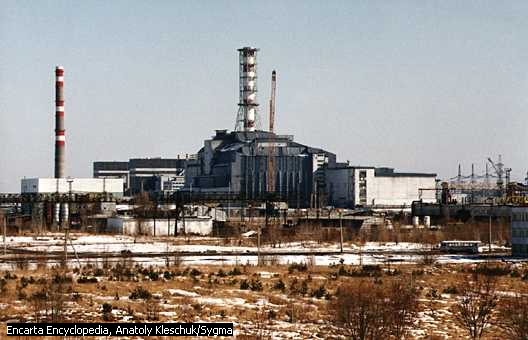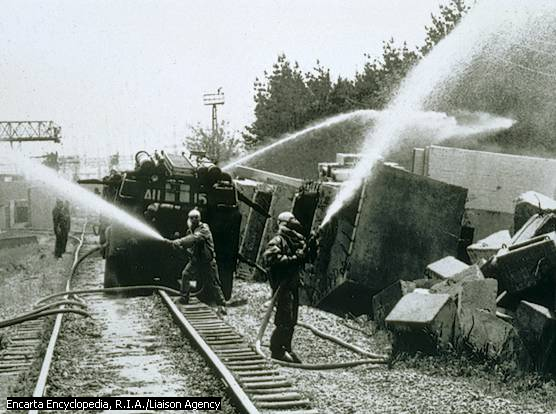
- •Concrete island*
- •Word-Combinations and Phrases
- •Topical vocabulary Man’s Impact on the Biosphere:
- •Protection of Atmosphere:
- •Protection of Soil:
- •Protection of Water:
- •Noise Pollution:
- •The Ways of Solving Ecological Problem:
- •Save the Earth!
- •The Environmental Crisis – Number One International Problem
- •Animals in danger
- •Food Safety
- •The Throw-Away Society
- •The Green Answers
- •1. Throw Away Less Rubbish
- •2. Turn Rubbish into Energy
- •3. Use Rubbish Again
- •What is Recycling?
- •Trash or Treasure?
- •The Three Rs of Trash
- •Student Trash Profile
- •The Fossil Fuel Data-Bank
- •The Nuclear Power Data-Bank
- •Solar Power
- •Geo-Thermal Power
- •Wind Power
- •The Future
- •Where Does Our Tap Water Come From?
- •What can you do?
- •Environmental Education and the Public Ecological Movement
- •Glossary
- •Appendix
- •Flower thieves
- •Video Comprehension Duration: 3 minutes and 3 seconds
- •Salmon return to the thames
- •Video Comprehension Duration: 2 minutes and 16 seconds
- •Changing weather
- •Thunderstorm
- •Precipitation
- •How can behaviour and economics be made more climate-friendly?
- •The twenty-first century and beyond
- •Secretary-general kofi annan in the millennium report: biodiversity – the web of life
- •Secretary-general kofi annan in the millennium report: what are we doing to our planet?
The Fossil Fuel Data-Bank
The energy in fossil fuels came from the sun thousands of years ago. First, plants stored it. Then the plants died. After that their cells (and all the energy stored inside them) slowly turned into coal, gas and oil.

Man can't make new fossil fuels. When we've used all the coal, gas and oil on Earth we'll need to get our energy from somewhere else.
Each person in the First World uses the energy from six tonnes of coal (or the same in gas or oil) every year. 94% of that energy comes from fossil fuels.
The average American uses twice as much energy as a European (and 1,000 times as much as someone from Nepal).
In the 21st century there will be less and less oil and gas. As this happens, both fuels will become more expensive.
Coal will last longer – perhaps for another 300 years.
Man uses 30% of all fossil fuels to heat buildings.
It's possible to save 50% of all energy in houses and 30% in industry. Energy conservation like this will become more and more important in the future. Why?
to save fuel
to save money
to cut pollution.
60% of all the world's oil becomes petrol for cars, buses and lorries.
In 1950 there were 4 million cars in Britain, today there are 25 million.
Modern cars use much less fuel than 20 years ago. But experts think there will be 50% more cars in the year 2010 than now.
The world's top four coal producers are America, Russia, China, Germany.
The world's top five oil exporters are Saudi Arabia, Russia, The United Arab Emirates, Venezuela, Nigeria.
The most important fuel for 2 billion people in the Third World isn't coal, gas or oil. In parts of Africa and Asia, 80% of all energy comes from wood.
The burning of fossil fuels (and wood) adds to
the Greenhouse Effect
Acid Rain.
What do you know about nuclear energy, its sources, way of production? What are its +s and –s? Learn more about it from the information about the countries that produce and use it.
The Nuclear Power Data-Bank
Russia built the first nuclear power station in 1954.
The fuel which nuclear power stations use is a rare metal – uranium. One tonne of uranium can produce as much energy as 20,000 tonnes of coal.

Electricity from nuclear power is far more expensive than energy from oil.
These countries all produce uranium... Russia, Canada, America, South Africa, Australia, China.
Nuclear power doesn't pollute the atmosphere like fossil fuels. But it does produce waste. This stays radioactive for thousands of years and is very dangerous. At the moment most stations
bury their waste deep underground.
bury their waste at sea.
send their waste to other countries. (Britain, for example, accepts and buries nuclear waste from several countries.)
Nuclear experts say it's safe to bury radioactive waste. Other scientists aren't so sure. Many think it will seriously pollute the sea or the Earth one day.
Another problem for the nuclear industry is leukaemia. This is a cancer of the blood. Usually it's very rare – but not near several British nuclear power stations. There, the number of people with the disease is much higher than normal. Many of them are children.
Nuclear power stations are never in cities. That's because of the possibility of accidents. There have already been several serious ones. For example:
Sellafield (UK, 1957)
Three Mile Island (USA, 1979)
Chernobyl (USSR, 1986)
The accident at Chernobyl sent a cloud of radioactive pollution over Scandinavia and Western Europe. This pollution travelled for more than 1,000 kilometres. As a result, farmers had to kill millions of pigs, sheep and cows. But the accident didn't just affect animals – it affected people, too. Doctors expected to see 25.000 extra cancers before the year 2000 because of Chernobyl.
Since Chernobyl, many countries have stopped building new nuclear power stations. Many, but not all. France, for example, still believes in the future of nuclear energy. But other countries, like Sweden and America, are less sure now than in the '60s or '70s.

Green organizations all over the world are against nuclear energy. In their opinion it's dirty, unhealthy and dangerous.
Now that you know more about nuclear and other traditional sources of energy, compare them with the new alternative ones. Which of them do you consider most efficient? Why?
